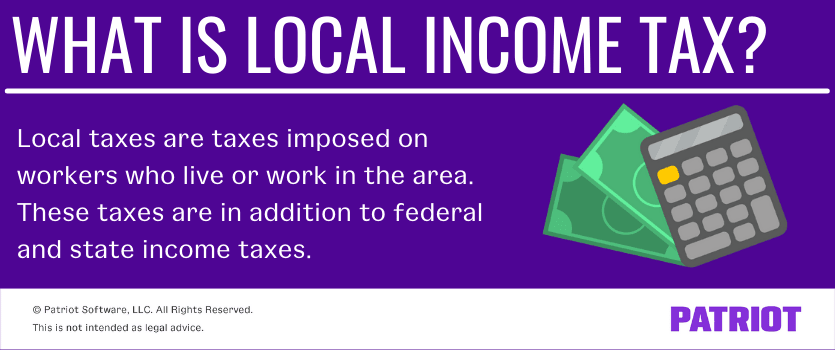Here’s another tax to add to the payroll checklist: local income tax. Cities, counties, small areas, and localities across the country have a local income tax for individuals working or living in the area. But, what is local income tax? What are your responsibilities?
What is local income tax?
So, what is local tax exactly? Is income tax a local tax? Local income tax is a type of tax some local governments impose on people who live or work in a specific area. The local income tax is in addition to federal income and state income taxes.

Only localities in states with state income tax impose a local income tax. As an employer, you must pay careful attention to the local taxes where your employees work. If the tax is a withholding tax, local tax laws require you to withhold the tax from employee wages and remit it. But if the tax is an employer tax, you must pay it.
What is local tax withholding used for? Local governments use local withholding tax to fund a variety of programs, including:
- Education (i.e., school districts)
- Parks
- Community improvement projects (e.g., road repairs)
Local taxes are also known as municipal taxes. These taxes may be school district, town, city, or county-specific.
School district tax
Some local governments impose a specific kind of local tax known as a school district tax. Funds from this type of tax go toward the operating costs of the local school district. In some cases, the tax is an income tax. In other cases, it is a property tax.
If a school district imposes a local tax, all residents must pay the tax even if they work outside its boundaries. Employers may need to handle a school district income tax. Check with your employee’s local tax office for more information.
States with local income tax
Again, only states with state income tax impose local income taxes. But, not all states with state income taxes have local taxes. And, not all localities in states with state income taxes impose local taxes.
The following states have localities with local taxes:
- Alabama
- Arkansas
- California
- Colorado
- Delaware
- Indiana
- Iowa
- Kentucky
- Maryland
- Michigan
- Missouri
- New Jersey
- New York
- Ohio
- Oregon
- Pennsylvania
- West Virginia
If multiple localities impose a local tax, you may have to withhold or pay both taxes. Or, you may need to withhold or pay the higher of the two taxes. For example, Pennsylvania residents must pay the higher of the two local taxes if they work in a different locality than where they live.
Employers may also choose to withhold and remit taxes based on residency if you are only required to withhold based on work location. For example, if you are an Ohio employer, you may choose to withhold and remit local taxes for the resident city. However, you must withhold local income taxes for the work location city if a local income tax is in place.
Types of local income taxes
Not all local taxes are the same. And, not all are permanent.
Permanent local taxes fund operating budgets for the municipality. Localities may impose temporary or short-term local taxes to fund specific purposes (e.g., bridge construction or repair).
Because local taxes can change, stay up to date with withholdings and records. Consider checking with your local government annually to ensure you use the correct tax rate or are aware of any other changes.
In many cases, employers withhold local income taxes and remit them to the local tax authority. But in other locations, the employer pays the tax (e.g., Colorado occupational privilege tax).
Not all municipalities calculate the tax the same way. The three most common ways localities assess local income taxes are:
- Flat tax rate: A single rate applies across all income levels (e.g., 2%).
- Progressive tax rate: The tax rate increases as a worker’s income level increases.
- Flat dollar amount: All employees pay the same dollar amount, no matter their income level (e.g., $2 per week).
How local governments require tax computation, collection, and spending can vary between jurisdictions. This is true even for jurisdictions located in the same area. Consult your local laws to understand the specific tax requirements.
Withholding local income taxes
What is local tax withholding? If an employee works in a location that imposes a local income tax, you must deduct the tax from their wages. What is local income tax withholding rate? Local tax laws and rates vary. Check with your local government for rates.
For local income tax withholding, register with the income tax office of the school district or location where your business is located.
Every time you run a payroll, calculate each employee’s taxable wages. Then, determine how much to withhold by using tax tables or multiplying by the local rate. If you use payroll software, it should calculate the withholding for you.
Once you withhold local taxes, you need to remit them. Often, local taxes are due quarterly, but due dates vary. Check with your local taxing agency to determine when you need to deposit local taxes.
After the end of the year, send Form W-2 to everyone you employed during the year. Form W-2 lists the amount of taxes you withheld from each employee’s wages.
What is local wages on W-2?
Again, employers must report local wages and local income taxes on the employee’s Form W-2 at the end of each year. Report local wages in box 18 and local income tax withheld in box 19.
What are local wages? Local wages are all wages subject to tax within the locality. Not all localities tax all wages. For example, some localities may not tax wages subject to Section 125 cafeteria plans. So, the employer would deduct the amount of the cafeteria plan from the employee’s wages before calculating the local income tax.
Check with your local government to determine what wages are not subject to local income tax.
This article has been updated from its original publication date of 4/19/2012.
This is not intended as legal advice; for more information, please click here.


